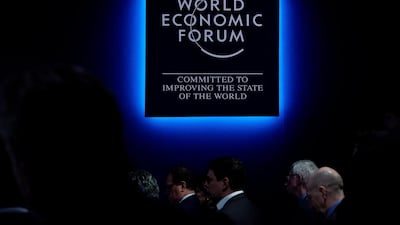"A Thousand Private Jets Deliver Globalist Elite to Davos for Climate Change Summit". That is the headline Breitbart News used to cover the Annual Meeting of the World Economic Forum. Of course the fact that US president Donald Trump is attending Davos this year has not been well-received by Breitbart, which played an important role in getting Mr Trump to the White House. The far-right news network also stands against what Davos represents in terms of globalisation and collective actions.
But the greater issue lies in the article's information being shared as "fact". While the use of private jets has increased this year, the meeting in Davos is not in any way a "climate change summit".
And yet, that detail seems to be irrelevant to the editors. A case in point of the troubles faced by journalists and readers - from fake news to propaganda. The impact of fake news and the challenges facing the media industry are among the issues troubling leaders from public and private sectors.
In a session at Davos on Wednesday, the divisions over fake news among journalists themselves, and the vested interests behind some media outlets, were on full display. The session entitled ‘Fake News versus Real Politics’ witnessed Anna Belkina, Deputy Editor in Chief of Russia Today accuse French President Emmanuel Macron of "false information", after she was questioned about RT’s role in spreading unfounded accusations against Mr Macron.
_______________
Read more:
Davos 2018: French president calls for powerful Europe in climate change appeal
Davos 2018: Trump roiled the elite on campaign - now he joins them
_______________
Ms Belkina responded by saying that Western journalists had spread ‘fake news’ by reporting on Iraq’s weapons of mass destruction in 2003, later to be discredited. Managing Editor of the New York Times Joseph Kahn responded by saying that it is "dangerous" to conflate fake news with the Iraq WMD case, as journalists reported what officials had confirmed was intelligence. It was a lively session highlighting the role of perspective, context and political attitudes in influencing various media outlets. And yet Mr Kahn insisted that facts exist and should be reported as facts.
Behind closed doors, senior editors and journalists have been speaking to senior executives from tech companies like Google and Facebook who are attending Davos. As publishers and platforms try to figure out how to navigate changes to the media industry, the results of the latest Edelman Trust Barometer set a worrying benchmark. The US, UK, France and Germany all witnessed a drop in percentages of trust in media and public institutions.
According to the Edelman results released this week, globally 70 per cent of respondents from the general public are concerned that fake news or false information is being used as a weapon, while 59 per cent of respondents struggle to know if a particular piece of news came from a trusted media organisation. For the first time in the Trust Barometer history, media has become the least trusted institution globally.
Davos has presented the media industry with a sizeable challenge - to tackle this decline in trust. Thankfully, in the UAE, trust in both the media and public institutions rose last year.

